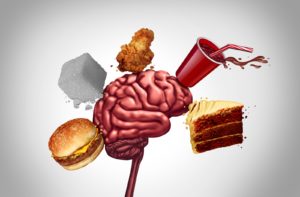A healthy diet means so much more for the body than making sure your pants fit! The food we eat has a tremendous impact on our physical and mental wellbeing; every vitamin and mineral has a role to play in our overall health.
Eating a healthy and varied diet is especially important for seniors. The Villages of Murfreesboro strives to ensure each resident has access to quality meals containing the finest ingredients to help maintain cognitive function.
Healthy eating helps lower the risk of cancer and diabetes, and keeps your heart in its best shape. But did you know that some foods positively impact cognitive functions, and others are linked to severe health problems, Alzheimer’s disease, and dementia?
If you are becoming increasingly forgetful, it may help to pay close attention to foods you’re eating throughout the day, and make changes by limiting or removing memory-impacting foods from your diet.
Healthy Foods For the Brain
Your brain is the body’s powerhouse, and it needs specific types of foods to stay healthy, like:
- Fruits
- Vegetables
- Healthy fats
- Lean proteins
- Vitamins
- Minerals
If your diet lacks these essential foods and is overrun with complex carbohydrates, sugars, and processed foods, it may build up toxins in the body. Excessive toxins can lead to various health conditions, including impaired cognitive function and memory loss.
How Does Food Affect My Memory?
Do you find yourself forgetting what happened in a movie you watched the night before? Lose your train of thought in the middle of a sentence? Walk into a room and forget why you entered it? Yes, forgetfulness is part of growing older, but it can also be connected to your diet.
Your brain consistently needs healthy fats, vitamins, and minerals for your brain to thrive.
Almost everything we eat affects cognitive function. Your brain uses a large amount of the food you consume, and quality matters. Think of processed foods as a drive-through meal for your brain; okay as an occasional treat, but unhealthy when eaten frequently and in large quantities.

5 Worst Foods for Your Brain & Memory
Many foods in today’s American diet are connected to memory loss, and the majority of them build up specific proteins in the body associated with Alzheimer’s disease. Here are the top worst offenders:
- Processed meats & cheeses: Foods like bacon, ham, and meats from the deli counter contain nitrosamines. Nitrates cause increased fats in the liver, which can be toxic for the brain. Excessive consumption of processed meats can also increase the risk of dementia.
Processed cheese is a significant source of saturated fat, which can clog brain vessels, cause inflammation in the brain, increase the risk of stroke, and impair cognitive function.
- Alcohol: Many beers contain nitrites, which, as mentioned above, have been linked to memory loss. Additionally, alcohol affects blood flow to the cerebellum, the portion of your brain associated with coordinating thoughts.
Studies have shown that heavy drinking increases the odds of dementia and encourages its early onset.
- White foods: White foods are a group of foods considered high glycemic, and these foods include:
- White Sugar
- Pasta
- Cake
- Potatoes
- White rice
- White bread
High glycemic products are stripped of nutrients and fiber, resulting in quick digestion and surges of sugar in your bloodstream. Elevated blood sugar levels are linked to diabetes, a condition often associated with Alzheimer’s disease.
The Villages of Murfreesboro aren’t suggesting that all carbs are bad. Trust us; we love treats! But, we recommend our residents reach more often for whole carbs with fiber still intact, like whole-grain bread and rice.
- Fried foods: Deep-fried foods like chicken, french fries, and other treats can harm your cognitive abilities. These foods can cause increased fat production around the organs, which is associated with brain tissue damage.
- Microwave popcorn: Yes, this one stings a little bit, but microwave popcorn is known to contain traces of diacetyl, an ingredient that can increase amyloid plaque in the brain.
Amyloid plaques are abnormally configured proteins, and researchers suggest that they play a crucial role in the development of Alzheimer’s disease.
Foods That Can Help Avoid Dementia
We know it isn’t always easy to change your eating habits, but avoiding foods connected to memory loss can help increase your health and personal wellbeing. Start slowly by making a few changes to your diet and relying on healthier meal choices.
Check out these healthier options to help boost your cognitive function:
- Leafy greens
- Salmon
- Berries
- Dark-skinned fruits
- Coffee
- Dark chocolate
- Extra-virgin olive oil
- Whole carbohydrates
Moderation is Key
Your daily diet has a critical effect on cognitive function and your overall health. It’s essential to reach for foods that keep your brain healthy, and consume less healthy options in moderation.
The Villages at Murfreesboro recommends speaking with a medical professional before making changes to your diet. Contact our knowledgeable team if you have questions about memory loss or healthy eating for seniors. We’re always happy to help!




